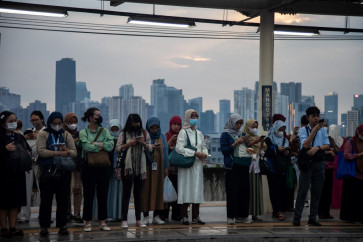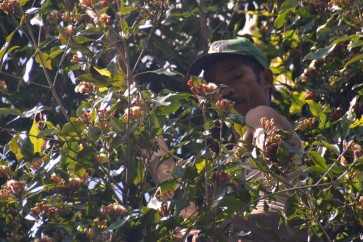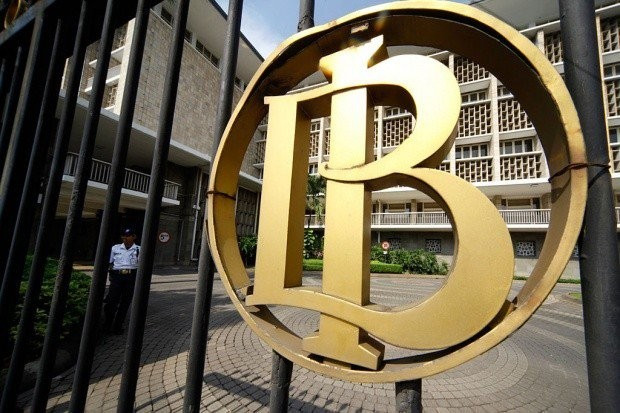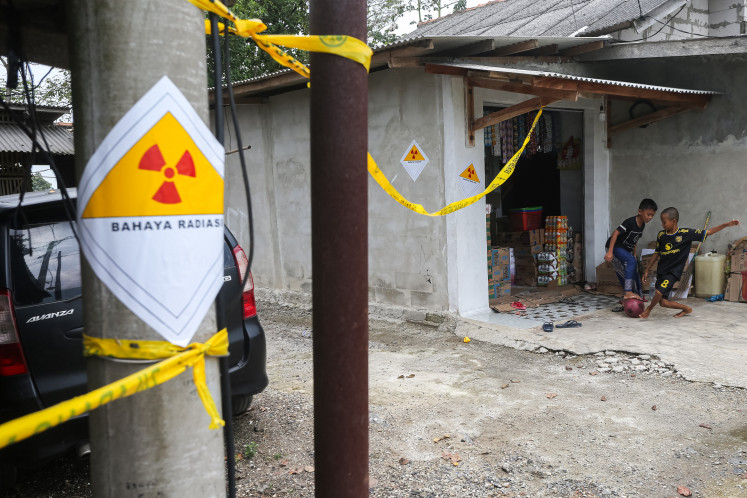Popular Reads
Top Results
Can't find what you're looking for?
View all search resultsPopular Reads
Top Results
Can't find what you're looking for?
View all search resultsPenny Robertson: Teaching society to fit in
JP/R
Change text size
Gift Premium Articles
to Anyone
J
span class="caption" style="width: 398px;">JP/R. Berto WedhatamaOne in 800 newborns worldwide is estimated to have the common chromosomal disorder called Down syndrome (DS), the cause of learning disabilities and related medical problems of various severity.
However, such persons are rarely seen in our dense cities — many are kept out of sight, along with the millions who are not “normal”. Excuses abound: They will wander off, they will frighten strangers, and they will cause a lot of trouble — and shame, especially to high-profile, high-achieving moms and dads. “Don’t tell anyone,” was the message from a father of a Down syndrome child, saying he feared for his job, a top position in a leading company.
“Why? Why are you defined by your job?” asks Penny Robertson, a mother of three including Shona — the daughter who’s birth on July 24, 1981 changed her life. Since then, Penny has spent much of her time getting people’s priorities right — by not hiding children with DS, but helping them blend into society and reach a degree of independence. Penny works to embolden parents who have held back in expressing pride and love for their kids because their child’s accomplishments might differ from their peers — such as being able to lick chocolate off one’s lips, or succeeding in buttoning up a shirt at 14 years old, or older. Such motor skills happen to be landmarks for a person with DS.
With other exasperated, but persistent parents, Penny drives home the message that it is society that needs “to fit in”, to depart from the boxes of what’s “normal” and expose people to a greater diversity of capabilities, especially the unknown potential of those who look different.
Penny’s daughter turned out to be quite “different” shortly after the family moved to Jakarta, though she had attended a regular school back in Adelaide. Unexpectedly, no international school would accept Shona, triggering Penny’s blunt message to one principal, who had said the school could not accept handicapped children: “My daughter has a mental disability and it is you who are handicapping her.”
This led to a new chapter of Penny’s life — initiating and co-founding the Australian International School in 1996, which is open to children with special needs.
Gone was her initial plan of, she says jokingly, living the life of the lady expat “lounging by the pool”. Penny still enjoys swimming like any true Aussie — but doing much, much more besides lounging by the pool, and learning a lot, too.
For one, she learned that not everything needs bribes in Indonesia. In the grueling process to secure a license for AIS, Penny said the official in charge at the time finally handed her the document ahead of the opening day, with “tears in his eyes”. Possibly it was the influence of Shona, who would always accompany her mother to the Education and Culture Ministry. People genuinely open up and change, says Penny, once they are exposed to
differences.
With other like-minded people from Brazil and several other countries, Penny also co-founded Down Syndrome International, based in London, which she has chaired since 2008. On World Down Syndrome Day at the UN headquarters in New York, on March 21, Shona will be among the speakers at the one-day conference titled “Building our future”, to be opened by her mother, and UN Secretary-General Ban Ki-Moon. In Indonesia, the government is to commemorate the international day for the first time. The date (3/21) highlights the three copies of “chromosome 21”, a genetically unique condition to persons with DS.
Shona is now 30, in love and preparing for a wedding back home in Australia — reinforcing another lesson that Penny said she has acquired: that at the end of the day, people with DS, and any disability, just want to live a normal life, and contribute to society — if society lets them.
As a chief world campaigner for DS, Penny has an air of casual self-confidence. “We wonder if we can be like her,” says Aryanti Yacub, the chairperson of the Indonesian Association for Down Syndrome (ISDI). She’s a leader, but a distressed mom all the same. “All the experts care about is a child’s IQ,” Aryanti says — while her son Michael may be the first Asian golfer with DS. But three decades ago, Penny was just as ignorant as other parents.
Shortly after Shona’s birth, Penny said she found an abundance of research on DS, but which was not made available to parents, who needed the information most. She approached local authorities to help spread the information and facilitate urgently needed early intervention programs for children with DS. Her sense that parents worldwide had similar needs led to the establishment of the DSI.
Parents of children with DS are acutely sensitive to what parents like Aryanti see as the peculiar difference in social acceptance of disabilities. “From a young age we were taught to help the blind,” she said.
But the “mentally retarded” are often cruelly mocked as “crazy” — likely because those with mental disabilities cannot speak up for themselves, compared to those with physical disabilities, says Penny.
She learned firsthand that it is adults who teach rejection of such differences — not children. Shona, Penny remembered, went missing just as the family was preparing to move into their home in Warung Buncit, South Jakarta. The mother was finally relieved to find Shona near a badminton field surrounded by children “in total acceptance”. “They were teaching her Indonesian and she was teaching them English,” said Penny.
Once exposed to DS, she adds, gradually people understand that basically, any child can be affected by the chromosomal disorder, that the child will always live with DS, and that they can lead productive lives nonetheless. But this can only happen following the very first step — when parents themselves accept their children, Penny and Aryanti say.
Only then can parents and families educate other communities.
And how and when do you tell parents that? Parents like many Indonesians, who have pregnant women undergo rituals to ensure they have the perfect child that society appreciates? “When they have gotten over their shock, their denial — and their grief,” says Penny. “And then eventually, a parent will tell me that they do have the perfect child, that they wouldn’t want any other.”
But can society here fully accept children with mental disabilities? Look at Singapore, says Penny, noting “dramatic change” since the establishment of the Down Syndrome Association Singapore in 1995. The typical attitude of pressuring children into the rat race, and hiding those with disabilities, was just the same as in Indonesia — unlike today. “If Singapore can do it, Indonesia can,” she says.










